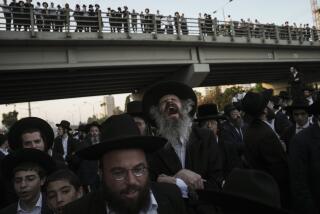Dispute Over Ethiopian Jews May Become Israeli Political Crisis
- Share via
JERUSALEM — A clash of wills pitting hundreds of Ethiopian Jews against Israel’s religious establishment threatened Wednesday to erupt into a political crisis as the Ethiopians marked the 15th day of a protest sit-in on a busy Jerusalem street corner.
The Ethiopians, supported by leftist politicians, have turned the corner opposite the headquarters of the Chief Rabbinate into a makeshift refugee camp. They are protesting against what they say is the insistence of the rabbinical authorities that they undergo symbolic conversion before being allowed to marry.
Prime Minister Shimon Peres and several other officials have repeatedly sought to bring about a compromise settlement, so far without success.
The Chief Rabbinate is Israel’s ultimate religious authority, with broad powers over marriage, divorce and other matters that in many countries are dealt with by civil authorities.
See Requirement as Insult
There are about 15,000 Ethiopian Jews in Israel, more than half of whom arrived last winter during “Operation Moses,” a secret airlift.
They are believed to be descendants of a lost tribe that maintained its religious traditions despite being separated from mainstream Judaism for 2,000 years, and many of them consider the rabbinical requirement to be a slur on their Jewishness.
Israel’s National Religious Party involved itself in the dispute Wednesday, threatening to bolt the coalition government unless there is an immediate halt to what it called political interference in the work of the Chief Rabbinate.
The party, which has close ties with the rabbis, controls only four of the 120 seats in Parliament and could not by itself bring down the coalition government. But it often holds the balance of power, and both major political blocs have openly courted it.
The party’s threat underlines the increasing politicization of what the Ethiopian Jews--who are sometimes called Falashas, though they consider the term derogatory--see as a battle for legitimacy in Israeli society. (Falasha means stranger in the ancient Ethiopian language).
‘The Authentic Jews’
“Ghetto Rabbis Remember: The Falashas Are The Authentic Jews!” says a poster on an apartment building near the site where about 400 Ethiopian Jews were preparing to spend another night of protest. The implication was that the Ethiopians had remained truer to original Jewish law than those they accuse of questioning their Jewishness.
The rabbis insist that they are not challenging the Ethiopians as Jews. But they stress that Jewish law is particularly strict in its prohibition of intermarriage. And because of the Ethiopians’ long isolation and the possibility that there may have been some intermarriage with non-Jews in Ethiopia, they say, extra precautions are necessary.
The issue of ritual conversion surfaced soon after Operation Moses brought the Ethiopians to Israel last winter. At first, the rabbis insisted that the newly arrived men undergo ritual circumcision as well as a ceremonial bath to confirm their Jewishness. Later, they dropped the circumcision requirement.
In July, Peres personally brokered a compromise under which the rabbis publicly recognized the Ethiopians as Jews and promised to consider each marriage individually.
However, the protesters contend, the rabbis have insisted in practice that every Ethiopian undergo ritual conversion before marriage. They say that about 100 young couples who want to be married cannot because they refuse to comply with the conversion requirement.
In support of those couples, hundreds of Ethiopian Jews began the sit-in on Sept. 4.
Arrived With Own Leaders
Yossi Sarid, a leftist member of Parliament, said the problem has arisen because “these people came with their own religious leadership.”
The protesters contend that only their religious leaders are qualified to certify their Jewishness. But Sarid said the chief rabbis “can’t accept another religious establishment (because) otherwise they lose their monopoly.”
According to the director general of the Ministry of Religious Affairs, a government survey showed that 60% of the Ethiopian Jews have already undergone symbolic conversion.
The protesters dispute the figure, saying that only about a third have done so. Many of them, according to Shlomo Akale, one of the organizers of the demonstration, were frightened into it. Some, he said, were threatened with the withdrawal of government economic support.
More to Read
Sign up for Essential California
The most important California stories and recommendations in your inbox every morning.
You may occasionally receive promotional content from the Los Angeles Times.













